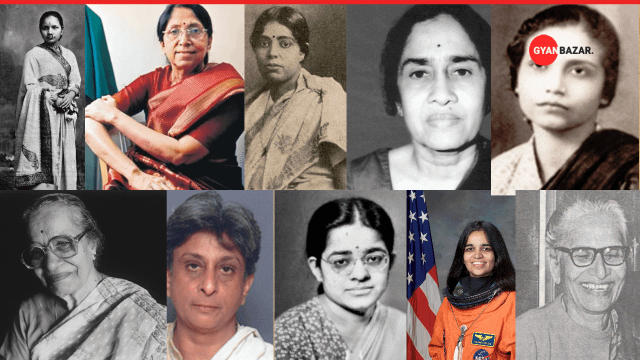In India, there is a rich history of women scientists who have made significant contributions to the field of science. These remarkable women have defied societal norms, overcome challenges, and emerged as trailblazers in their respective domains. Their achievements have not only advanced scientific knowledge but have also paved the way for future generations of female scientists. In this article, we celebrate the remarkable contributions of some of the top female scientists in India, recognizing their invaluable work and the impact they have made on the scientific landscape.
Anandibai Gopalrao Joshi:

In 1883, at the age of 19, Anandibai enrolled in the Woman’s Medical College of Pennsylvania’s medical program. She embarked on her journey to become a doctor, and at the age of 21, she earned her MD in obstetrics. Anandibai’s thesis, titled “Obstetrics Among the Aryan Hindoos,” incorporated elements from both Western and Indian Ayurvedic medicine. Her remarkable achievements were even acknowledged with a congratulatory note from Queen Victoria upon graduation.
Janaki Ammal:

Born in Tellichery, Kerala, in 1897, Janaki Ammal was a distinguished Indian botanist known for her contributions in cytogenetics and phytogeography. Her notable research focused on sugarcane and eggplant, and she extensively collected medicinal and economic plants from Kerala’s rainforests. Janaki Ammal became the first woman botanist in India and was honored with the prestigious Padma Shri award in 1977. Her research on flowering plant chromosomes, sugarcane varieties, and hydro-electric projects solidified her legacy in the field. In fact, the Magnolia Kobus Janaki Ammal is a flower named after her.
Kamala Sohonie:

Dr. Kamala Sohonie was a prominent advocate for women in STEM fields. Her notable battle with a Nobel Laureate paved the way for Indian women’s admission to the Indian Institute of Sciences. Despite facing numerous challenges, she became the first Indian woman to earn a Ph.D. in a scientific field. Dr. Sohonie went on to become the director of the Indian Institute of Science and co-founded the Consumer Guidance Society of India with eight other women in 1966. From 1982 to 1983, she served as their president. Her remarkable contributions were recognized with the National Award for Excellence and Contribution to Science in 1997.
Rajeshwari Chatterjee:

In the realm of STEM, numerous courageous women have defied the odds and showcased their abilities, inspiring others to pursue careers in science for the betterment of humanity. Among them stands Rajeshwari Chatterjee, a true trailblazer as the first female engineer in our country. After obtaining her Ph.D. in 1953, Rajeshwari Chatterjee returned to India and dedicated herself to teaching electromagnetic theory, electron tube circuits, microwave technology, and radio engineering at the Department of Electrical Communication Engineering in IISC.
During a time when scientific research was still in its nascent stage, Rajeshwari Chatterjee shattered barriers and became a pioneering figure in engineering for Indian women. She went on to pursue a master’s degree in mathematics, and her incredible achievements earned her the distinction of being the sole woman faculty member at the Indian Institute of Science (IISc) in 1953.
Rajeshwari Chatterjee specialized in the field of microwave engineering, making notable contributions that garnered recognition and accolades. Her research and teaching work at the Institute of Electronics and Telecommunication Engineers earned her prestigious awards such as the Mountbatten prize, J.C Bose Memorial prize, and Ramlal Wadhwa Award. Furthermore, she conducted vital Radio Frequency Measurements at the National Bureau of Standards in Washington D.C under the auspices of the Indian government.
Kalpana Chawla:

Born on March 17, 1962, in Karnal, India, Kalpana Chawla left an indelible mark as an astronaut and a symbol of inspiration. In 1994, she was selected as an astronaut candidate and contributed significantly to space exploration. Kalpana worked with Robotic Situational Awareness Displays and evaluated software for space shuttles. As a crew representative for the Astronaut Office EVA/Robotics and Computer Branches, she underwent rigorous training.
Kalpana Chawla possessed a deep commitment to providing science education opportunities to young girls in India. During her time as an astronaut, NASA invited her secondary school to participate in their Summer Space Experience Program. Since 1998, two girls from her school have been selected to attend the United Space School of the Foundation for International Space Education in Houston, thanks to Kalpana’s dedication.
Dr. Indira Hinduja:

Over the past four decades, artificial reproductive technologies have advanced significantly, and Dr. Indira Hinduja has been at the forefront of this progress in India. Driven by her passion and curiosity, she delved into the world of in-vitro fertilization (IVF) and received permission to conduct trials on women, marking a groundbreaking milestone.
Dr. Indira Hinduja’s remarkable contributions have earned her numerous accolades, including the Federation of Obstetric and Gynecological Society of India’s Lifetime Achievement Award (1999), the Dhanvantari Award (2000), and the esteemed Padma Shri (2011). Her work has garnered praise worldwide, and she has authored over 114 scholarly publications in various national and international journals.
Dr. Aditi Pant:

A successful oceanographer, Dr. Aditi Pant holds the distinction of being the first Indian woman to visit Antarctica in 1983 as part of an Indian geology and oceanography mission. Her dedication to marine sciences led her to receive a prestigious scholarship from the US government to pursue a master’s degree in marine sciences at the University of Hawaii. Dr. Pant furthered her academic journey by earning a Ph.D. from London University’s Westfield College, focusing her research on the physiology of marine algae.
Throughout her career, Dr. Aditi Pant has contributed her expertise to renowned institutions such as the National Institute of Oceanography and the National Chemical Laboratory, among others. Her work has made significant strides in the field of oceanography and serves as an inspiration to aspiring scientists.
Bibha Chowdhuri:

Bibha Chowdhuri, a physicist, stands as an early contributor to the field of science and has a celestial tribute in her name. In December 2019, a star located approximately 340 light years away was named “Bibha” to honor the significant contributions of Indian women in the realm of science.
Chowdhuri, renowned for her work in elementary particle physics and cosmic rays, was the sole female student in her master’s program in Physics in 1934. Following her post-graduation from Calcutta University, she actively engaged in research projects within the field of physics. Notably, she collaborated with Vikram Sarabhai, widely regarded as the father of India’s space program.
Irawati Karve:

Irawati Karve, the first female Indian anthropologist, broke through the gender barriers prevalent in the male-dominated discipline of Indian society. Her multidisciplinary work encompassed storytelling and philosophy. In 1968, her acclaimed book “Yuganta” received the Sahitya Akademi Award for Marathi, marking her as the first female author in the state to achieve this recognition.
During a time when it was uncommon for women to pursue anthropology due to its requirement for diverse research across cultures, Irawati Karve pursued her studies in the field. She later played a pivotal role as a founding member and head of anthropology programs at various colleges. Additionally, she established the Department of Anthropology at the University of Pune in 1963 and served as the Vice-Chancellor of SNDT University. Notably, the Dr. Babasaheb Ambedkar Bhavan of Savitribai Phule Pune University (SPPU) houses the “Irawati Karve Museum of Anthropology,” preserving the rich cultural heritage of India.
Kamal Ranadive:

Kamal Ranadive, one of the early cancer researchers in India, emerged as a leading female scientist with over 200 research papers to her credit. She pursued studies in Botany and Zoology at Fergusson College, establishing herself as a prominent figure in the country’s scientific community.
In 1973, she founded the Indian Women Scientists’ Association (IWSA), an organization that continues to provide hostel and daycare facilities to women researchers. Kamal Ranadive’s significant contributions include being among the initial scientists to assert the relevance of heredity in breast cancer.
Raman Parimala:

Raman Parimala, an Indian mathematician, made notable contributions to the field of algebra. Her accomplishments were recognized with several awards, including the Bhatnagar Award, Srinivasa Ramanujan Birth Centenary Award, and the TWAS Prize. Raman Parimala held memberships in prestigious institutions such as the Indian Academy of Sciences and the American Mathematical Society.
She also served as a professor at the Tata Institute of Fundamental Research (TIFR) in Mumbai, where she contributed significantly to the advancement of mathematical knowledge.
Anna Mani:

Anna Mani, an Indian meteorologist and physicist, dedicated her expertise to theories related to solar radiation, ozone, and wind energy instrumentation. In 1940, she was awarded a scholarship at the Indian Institute of Science in Bangalore, where she conducted research under the guidance of the eminent professor C. V. Raman, exploring the optical properties of ruby and diamond.
Anna Mani published five research papers throughout her career and retired as the deputy director general of the Indian Meteorological Department in 1976, leaving a lasting impact in her field.
Kadambini Ganguly:

Kadambini Ganguly, a gynecologist by profession, stands as one of the first two women in India to hold a college degree and the first Indian woman to practice medicine. She served as a doctor until the age of 61, leaving behind a legacy of medical service.
Kadambini Ganguly also achieved the distinction of being the first female speaker at the Indian National Congress, making significant contributions to both healthcare and society.
Asima Chatterjee:

Asima Chatterjee made history as the first Indian woman to be awarded a doctoral degree in science from an Indian university. She pursued her studies at the University of Calcutta and later became the first woman president of the Indian Science Congress.
Her remarkable contributions to science were acknowledged through prestigious awards, including the Padma Bhushan. Asima Chatterjee specialized in the field of medicinal chemistry and natural products, leaving a lasting impact on the scientific community.
Archana Sharma:
Archana Sharma, an Indian woman botanist, cytogeneticist, cell biologist, and cytotoxicologist, played a vital role in advancing knowledge in these fields. She served as the founding editor of The Nucleus, an international journal of cytology. Her research focused on chromosomes of reproductive plants, pesticides, and other environmental agents.
Archana Sharma held positions within various departments of the Government of India, including the Science and Engineering Research Council of the Department of Science and Technology, the Environmental Research Council of the Ministry of Environment and Forests, and the Ministry of Human Resource Development.
Darshan Ranganathan:

Darshan Ranganathan, a pioneer in organic chemistry and one of the early female students at the University of Delhi, made significant contributions through multiple research fellowships, research papers, and books in the field of organic chemistry.
Her achievements were honored with a fellowship at the Indian Academy of Sciences in 1991 and the Third World Academy of Sciences Award (TWAS) in Chemistry in 2000 for her exceptional work in bio-organic chemistry, particularly in supramolecular assemblies, molecular design, and chemical simulations.
Conclusion:
The contributions of these top female scientists in India have been instrumental in shaping the scientific landscape of the country and inspiring generations to come. Through their groundbreaking research, perseverance, and passion for their respective fields, they have shattered gender barriers and emerged as role models for aspiring scientists. Their remarkable achievements remind us of the importance of diversity and inclusion in scientific endeavors, as well as the need to support and empower women in pursuing careers in STEM fields. As we celebrate their contributions, let us continue to encourage and nurture the talents of women in science, ensuring that their voices are heard and their achievements are recognized. Together, we can create a more inclusive and equitable scientific community that benefits from the diverse perspectives and talents of all individuals.

